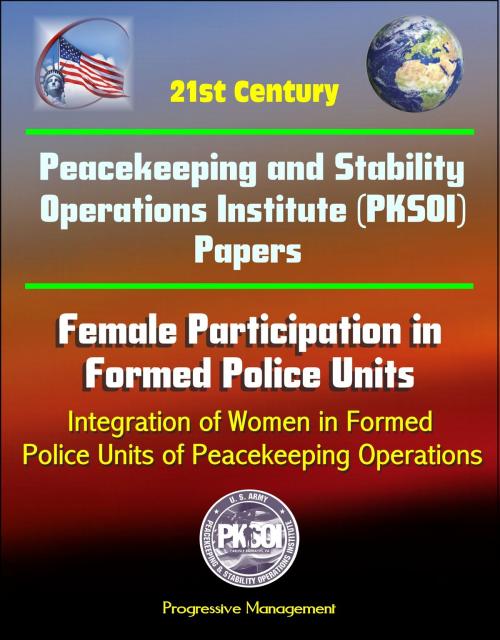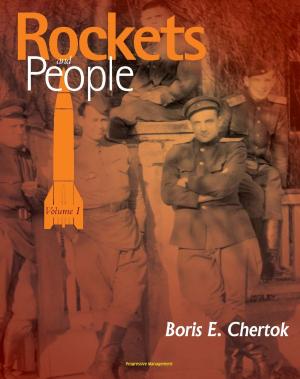21st Century Peacekeeping and Stability Operations Institute (PKSOI) Papers - Female Participation in Formed Police Units, Integration of Women in Formed Police Units of Peacekeeping Operations
Nonfiction, History, Military, United States| Author: | Progressive Management | ISBN: | 9781310961526 |
| Publisher: | Progressive Management | Publication: | November 16, 2013 |
| Imprint: | Smashwords Edition | Language: | English |
| Author: | Progressive Management |
| ISBN: | 9781310961526 |
| Publisher: | Progressive Management |
| Publication: | November 16, 2013 |
| Imprint: | Smashwords Edition |
| Language: | English |
From the foreword: When we co-authored the chapter, "As Time Goes By," The Expansion of Women's Roles in Police Work, in Quint C. Thurman's Controversies in Policing (2004), we were somewhat optimistic about the integration of women into policing. Both of us entered the world of policing in the early years - Dr. Hale as a young academic in the 1970's, a protege of Robert Trojanowicz, Director of the well-respected Michigan State School of Criminal Justice, the first such program in the U.S. Ms. Finkenbinder entered policing as a young military policewoman in the 70's, later transitioning to municipal police.
By 2004, Dr. Hale was a full professor at Shippensburg University and Ms. Finkenbinder, a recently departed municipal police patrol sergeant, beginning an academic career. We observed that women were no longer a novelty in policing but there were still plenty of obstacles to their full integration. Ms. Anderholt's research shows us that some things have not changed very much.
This report looks at the obstacles that continue to impact the integration of women into Formed Police Units (FPUs) of Peacekeeping Operations. FPUs are different from the standard UN police unit because they are recruited from a single-member state as a coherent unit, unlike UNPOL members which are recruited and often deployed as individuals. These units are intended to operate in high-risk environments. Because there is a lack of data about women in FPUs, Ms. Anderholt reaches back to the experiences of gender integration in municipal police departments in the United States and compares them with accounts of FPUs or related UN police units.
Her recommendations are consistent with our previous findings; however, the picture may be more optimistic. Modern U.S. Military combat operations have turned the traditional model on its head. In the last ten years, many military women have been deployed to Iraq and Afghanistan in high-risk operations. They have fought and died alongside their male counterparts in operations that have, heretofore, been the purview of their brothers in arms. Increasingly, women soldiers are thrust into "male" roles and are successful. This has not gone unnoticed in the U.S. military, as it continues to open up "combat" positions to women. This paradigm shift may be the force needed to tear down current barriers to the integration of women in FPUs. FPU's are considered to be more "tactical" as they engage in such missions as: riot control, crowd management, public safety, protection of UN personnel, evacuations of personnel in extreme situations, convoy protection, facilities protection, and assist local and UNPOL with high risk operations. Military women, proving themselves in combat operations, may unwittingly be the catalyst toward vaulting policewomen over the current barriers to full integration in FPUs. Hope springs eternal.
Topics covered include: UNTAG (Namibia), Bosnia Herzegovina, UNMIK, MINUSTAH (Haiti), ONUC (Congo), ONUSAL (El Salvador), ONUMOZ (Mozambique), UNTAC (Cambodia), UNMIL (Liberia)
From the foreword: When we co-authored the chapter, "As Time Goes By," The Expansion of Women's Roles in Police Work, in Quint C. Thurman's Controversies in Policing (2004), we were somewhat optimistic about the integration of women into policing. Both of us entered the world of policing in the early years - Dr. Hale as a young academic in the 1970's, a protege of Robert Trojanowicz, Director of the well-respected Michigan State School of Criminal Justice, the first such program in the U.S. Ms. Finkenbinder entered policing as a young military policewoman in the 70's, later transitioning to municipal police.
By 2004, Dr. Hale was a full professor at Shippensburg University and Ms. Finkenbinder, a recently departed municipal police patrol sergeant, beginning an academic career. We observed that women were no longer a novelty in policing but there were still plenty of obstacles to their full integration. Ms. Anderholt's research shows us that some things have not changed very much.
This report looks at the obstacles that continue to impact the integration of women into Formed Police Units (FPUs) of Peacekeeping Operations. FPUs are different from the standard UN police unit because they are recruited from a single-member state as a coherent unit, unlike UNPOL members which are recruited and often deployed as individuals. These units are intended to operate in high-risk environments. Because there is a lack of data about women in FPUs, Ms. Anderholt reaches back to the experiences of gender integration in municipal police departments in the United States and compares them with accounts of FPUs or related UN police units.
Her recommendations are consistent with our previous findings; however, the picture may be more optimistic. Modern U.S. Military combat operations have turned the traditional model on its head. In the last ten years, many military women have been deployed to Iraq and Afghanistan in high-risk operations. They have fought and died alongside their male counterparts in operations that have, heretofore, been the purview of their brothers in arms. Increasingly, women soldiers are thrust into "male" roles and are successful. This has not gone unnoticed in the U.S. military, as it continues to open up "combat" positions to women. This paradigm shift may be the force needed to tear down current barriers to the integration of women in FPUs. FPU's are considered to be more "tactical" as they engage in such missions as: riot control, crowd management, public safety, protection of UN personnel, evacuations of personnel in extreme situations, convoy protection, facilities protection, and assist local and UNPOL with high risk operations. Military women, proving themselves in combat operations, may unwittingly be the catalyst toward vaulting policewomen over the current barriers to full integration in FPUs. Hope springs eternal.
Topics covered include: UNTAG (Namibia), Bosnia Herzegovina, UNMIK, MINUSTAH (Haiti), ONUC (Congo), ONUSAL (El Salvador), ONUMOZ (Mozambique), UNTAC (Cambodia), UNMIL (Liberia)















